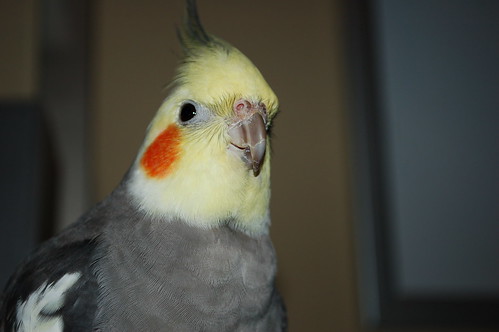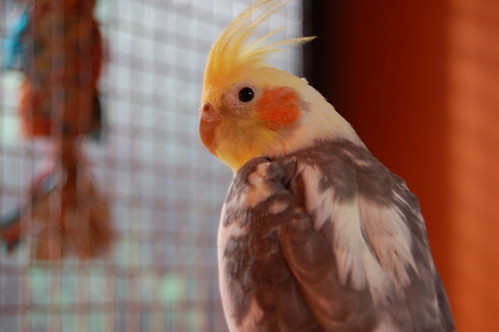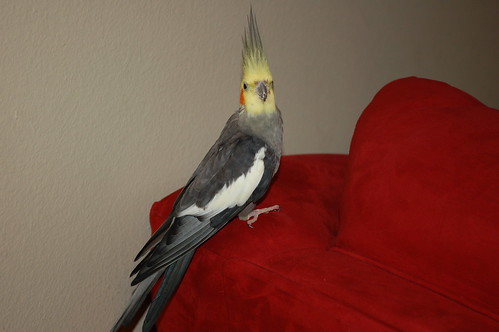
I can barely remember a time when I didn’t have cockatiels – they are one of my very favorite parrot species. As long as I have kept them, however, I have dealt with their night frights – a sudden disruption to their sleep that causes them to thrash in fear in the middle of the night. (Night frights are not limited to cockatiels, but they seem to be the species which suffers from them most.)
It’s a frightening experience for us too – the house is completely quiet and, suddenly, you are woken to the frenzied commotion of your terrified parrot. If you keep multiple cockatiels, they are all frightened into flight and it becomes chaos in the cage.
I always hurry to them to get them calm and settled. I know that the longer they flail around in terror, the higher the likelihood of injury. Parrots do not see well in the dark and cages are filled with hanging things that can entangle the wings of a bird that is unaware of their presence. Perches are obstacles that can break bones or blood feathers in a fall to the bottom of the cage. There is danger everywhere when a cockatiel is blinded by both darkness and fright.
Most cockatiel owners have had to contend with night frights at one time or another. We usually have no clue as to what exactly causes them because we are almost always sound asleep when they occur. But we can make some educated guesses and make appropriate changes to the birds night-time environment – if the night frights stop, or slow in frequency, we know we are onto something!

WHAT COULD FRIGHTEN A COCKATIEL AT NIGHT?
Birds sleep differently than we do. As prey animals, they do not fall into the deep sleep that humans are known to do. Further, they experience unihemispheric sleep – they can rest one side of their brain at a time keeping the other alert as needed – perhaps determined by what predators may be lurking about.
I remember reading a study about unihemispheric sleep several years back that explained that birds that roosted at the outer edges of their flock were much more likely to sleep unihemispherically than those who were kept sheltered at the center. Often the birds at the outside perimeter would keep one eye open throughout the night.
I suspect that our companion birds, knowing there is little threat, may allow themselves to sleep more deeply at night than wild birds. I wonder if this doesn’t play a role in the night frights of a cockatiel – imagine how scary it would be to a prey animal aroused from a deep sleep to what might be perceived as a predatory attack. I am a predator and I don’t like things that go bump in the night.
Cockatiel owners report that the most common things they have determined to be the cause of night frights are:
- Other household pets
- Rodent or insect infestation
- Moving shadows
- Headlights from passing cars
- Drafts that cause movement in cage covers or curtains
- Sudden noises
After my cockatiels had experienced a few bouts with night frights, I found myself paying very close attention to possible causes. In my house, movement plays a bigger role in night frights than sound. Neither storms, loud neighbors or even 4th of July fireworks ever frightened my birds into flight at night.
However, if I opened the door to the bird’s room without first announcing myself, or if the beam of a car headlight moved across the room, the motion would send them into a panic.

My solutions to night frights were very simple. I put the tiels into a sleeping cage at night that was kept in a spare bedroom. This placed a closed between the birds and the other pets in the event that they were the problem. The sleeping cage was small, and had only a single main perch that the birds shared, lessening the possibility of injury inside the cage during an episode.
The AC or heating vents caused drafts in that room, so I replaced the curtains with blinds that were heavy and immobile and stopped using a cage cover so there was no fluttering of fabric from the air current. The blinds also eliminated the potential problems with car headlights or shadows caused by trees.
I also placed a small night light in the corner of the room. The dim illumination allows them to see just enough that they aren’t confused or taken by surprise by things that happen in the dark, and it doesn’t cast enough light to disrupt their sleep. I put a baby monitor in the room so that I was aware of any disturbances. Small changes made a huge difference.
HOW CAN I CALM MY FRIGHTENED BIRD?
Should your bird experience an episode of night frights, turn on the light and call softly to it as you approach the cage. It’s a bit frightening to see the condition they are left in afterwards. Your bird will probably be on the cage bottom, pacing and hissing . Its chest will be heaving and it will be breathing heavily. It will look like it has been through a horrible ordeal.
Stay with your bird until it is calm. They seem to recover fairly quickly and are soon willing to go quietly back to sleep. On your way out the door, take a quick glance around to see if anything catches your eye that might possibly have caused the incident, and make a note to check the room thoroughly in the morning.
Author Patty Jourgensen specializes in avian health, behavior and nutrition and has been working with and caring for rescue birds since 1987.



20 comments
Thanks for sharing this helpful information. My cockatiel Chipper is going on 17 years old and I notice that he’s going through changes. I wondered if it was just me. You had me realize that environmental change and even a slight change in my approaching him can make a difference. Thanks again.
Thank you for this insightful article! As a cockatiel owner, I’ve experienced firsthand the distress night frights can cause for our feathered friends. Your tips and advice provide invaluable guidance on how to recognize and alleviate these episodes, ensuring our beloved companions feel safe and secure in their environment. Keep up the great work in educating and supporting bird owners everywhere!
I bought a baby monitor and yes I can clearly hear my.bird. Maybe I could.get to him before he hurts himself.
Golly this sounds horrific. I’m getting a cockatiel in six weeks.Is it better to put him in a small cage to sleep?
Our 2 year old bird sleeps in the room with my 9 year old daughter which us useful because they need about the same amount of sleep. His night frights seem to have become less since I started lifting one side of his cage cover to let some light so it’s not pitch black. The last night fright he got was when our cat killed a wild bird in the bedroom where he was sleeping. He woke up numerous times in the night and we only saw the dead bird in the morning. The cat and our tame birds get along well usually. I felt terrible, he must have been traumatized.
I am hesitant on getting a cockatiel for this reason because last January I lost my heart rabbit. Woke up to her screaming at around 6:00 in the morning from pain and she past away a few moments later. I know this isn’t related to birds but it was still extremely traumatizing for me. I would just be afraid to freeze up from this trauma and have my bird get injured or worse.
This is a good article!! However, us humans have never been predators. It’s a common misconception but we were actually prey that ate mainly fruits a couple thousand years ago. The very fact that we are prey animals is the reason we created housing to protect ourselves! Side note: my bird has been freaking out over the past two hours on and off, I don’t know why this is happening because he hasn’t had a night fright for around a year or two! He doesn’t hiss afterwards, he always just stares into nothing. I don’t think it’s a brain injury because he has always reacted by freezing afterwards… Cheers!
We just got a 2 month old cockatiel and we keep her in a separate room from the very first day and I don’t have a baby monitor. So, how would I know whether she gets any night frights or not? And as it is my first time handling a baby cockatiel I would love to know everything about it. Thank you.
Hi I was wondering if you could help me. It’s happened twice now. I went to my cockatiels cage and he seem disorientated. I put my hand out and he just fell over. Like he was paralysed. I put him in a box kept him warm.And he just wakes up the next morning. It’s not a poison or food.
We we first got our cockatiels we had the same issue with night frights. We discovered on our own that a tiny lamp worked great at night. I am glad you are advising this. It worked like a charm.
I work nights and my cockateil is in my bedroom, but i have another cage for him to sleep in a different room .What do i do to move him to his sleeping cage while he is asleep in his original cage? I get home about 10.00 oclock. What do i do. Would he bite me if i wake him up to move him to his little cage? He is hand fed about 2 months old.
Please add to your article that the owner should check for broken blood feathers (especially in untrimmed birds) and apply corn starch or styptic powder until bleeding stops.
What kind of lights should i use? So that my cockatiel can see? She just had a night fright😥 and thanks you so much for uplouding this.. I didnt really know what was up my birdie😭so thank u🤗
At 12:06 am, 3-15-19, I awoke to my sweet girl having a terrible night fright. Not often, but this one was bad. Thrashing, broke blood feathers in that short time, before I could reach her. I call her name, Sophie. Calmed her down.(She was 8 yrs old) besutiful girl. She went limp in my hands. Her head slumped and she died in my hands. I cannot figure what happened. My Heart is broken. 💔😢
Have anyone tried a “Night Light”. My tiels have this problem too and I read somewhere that a tiny light can help in this cases…
I had a cockatiel who had a night fright and flew into the side of his cage a broke his neck and died. I had him for 12 years and was heart broken. I think it was a huge lightening/ thunder that scared him. There was nothing I could do. I also only covered half his cage at night with a light on, too. He was the sweetest little guy with the best personality…
My tiel USED to do this. Now, I always leave a lamp on in the living room, near his cage. I have never had my Quaker do it nor my parakeet. It seems that having it dark in the room escalates the problem, so we never have it dark. Last winter, when our power was out, he had a few. I simply talked him out of it, shining the lantern in his direction. It worked every time.
Thank you, Patty for this very informative post. I will keep this in mind for my flock. I think my cockatiel died of a night fright. Gwen was prone to them, and was healthy whistling and chirping the day before. Nothing wrong, no symptoms of illness. I have read several books on illness and bird behavior and know what signs to look for. Thank you for this very informative post. Allison
Thank you for the most helpful information.
Hi Patty, my cockatiel did this a couple of times when he used to sleep near a window in may living room. About 3 years ago, I placed his cage in a quiet corner. Since then this problem has never happened again with him. Thanks for this very useful post!
Leave a comment